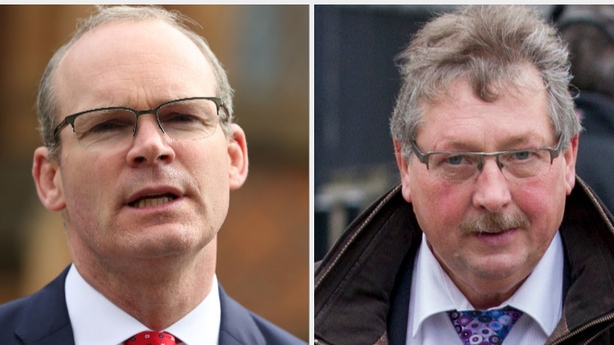Tánaiste Simon Coveney has said the Government will be flexible on solutions to issues of the post-Brexit border if the British government brings new thinking.
Mr Coveney said he did not believe there is a solution that could be managed by technology and said the way to deal with the border is through political agreement.
Speaking at a joint press conference with the French Foreign Minister Jean-Yves le Drian at Farmleigh this evening, Mr Coveney said shared custom arrangements which would prevent the need for border customs controls could form part of a solution to the border.
However he also said there would also need to be agreement on regulatory alignment.
He said he hoped any agreement would also prevent the need for controls between Northern Ireland and the rest of the UK as that is the desired outcome for the Government.
He said the Government will engage with any proposals on a customs agreement once it is clear that is the settled position of the UK government.
Jean-Yves le Drian said the French position is simple.
He said the EU has appointed Michel Barnier as negotiator and he is proceeding on the basis of that there can be no physical border in Ireland.

Coveney accused of 'slapping unionists on the face' over Brexit
The DUP's Brexit spokesman, Sammy Wilson, has accused the Minister for Foreign Affairs, Simon Coveney, of slapping unionists on the face, betraying farmers and food processors in the Republic and ignoring reality.
Mr Wilson, one of the ten DUP MP's who are propping up Theresa May's government at Westminster, was responding to comments made by the Tánaiste about a possible solution to the border issue in the Brexit negotiations.
Speaking on the BBC's Andrew Marr programme, Mr Coveney said using any form of infrastructure or technology to maintain separate customs regimes between the Republic of Ireland and Northern Ireland would not work.
He said the two governments could agree a "shared customs space or shared customs territory" and said the Republic of Ireland wants a "shared customs territory" where the same rules and regulations would apply on both sides of the border.
Speaking to RTÉ News, Sammy Wilson said Simon Coveney is not going to get what he wants.
He accused the Tánaiste of recommending that a border be placed down the Irish Sea and this would cut off most of the Irish economy from its biggest market. He described this as "a mad, bad idea".
He said this is a case of a Foreign Minister in the Republic being belligerent and said Mr Coveney is "trying to do with Brexit, what the IRA tried to do with bombs, that is break up the United Kingdom and it is not going to work."
He added that relations between the DUP and the Irish Government were at their lowest ebb.
The DUP's Sammy Wilson says Tánaiste Simon Coveney is trying to break up the UK with his attitude to border controls between North and South post Brexit pic.twitter.com/gPcBBb9MuX
— RTÉ News (@rtenews) May 13, 2018
Read more:
Feeding the British after Brexit
In response to Mr Wilson's comments a spokesperson for Mr Coveney said "nothing the Tánaiste suggested to the BBC is a threat to unionism, quite the opposite in fact.
"Many unionist communities and politicians are in ongoing contact with the Government and they too want the closest possible relationship and ongoing prosperity on the island of Ireland after Brexit.
Tit-for-tat and hyperbole has never solved anything in Ireland.
The spokesperson added that both the Tánaiste and the Government have been very clear that they "recognise and respect that Northern Ireland will leave the EU with the rest of the UK next March."
Theresa May insists she can be trusted to deliver Brexit
Meanwhile, British Prime Minister Theresa May has moved to try and ease cabinet tensions by insisting she can be "trusted" to deliver Brexit.
Her comments came after Cabinet divisions broke into the open after proposals for a customs arrangement with the EU were branded "crazy" by Foreign Secretary Boris Johnson.
Writing in The Sunday Times, Mrs May said: "You can trust me to deliver. I will not let you down."
Mrs May stressed the UK would be aligned with Brussels on some issues as there had to be "compromises" after withdrawal.
She said: "So, Brexit means that, while we may sometimes choose to take the same approach as the EU, our laws will be made in Westminster, Cardiff, Edinburgh and Belfast, with those laws tried by British judges."
And in comments that appeared to echo Mr Johnson's controversial pledge that Brexit would trigger a major boost for the NHS, the PM said: "I will ensure that we take back control of our money.
"We have agreed a settlement with the European Union and the days of vast contributions from taxpayers to the EU budget are coming to an end.
"So, Brexit means there will be billions of pounds that we used to send to Brussels which we will now be able to spend on domestic priorities, including our National Health Service."
Mrs May has divided the cabinet into two groups to consider the customs options being looked into.
The customs arrangement with the EU that Mr Johnson opposes would see the UK collecting tariffs on behalf of Brussels.
An alternative option called maximum facilitation, known as "Max Fac", would rely on new technology and trusted trader schemes to get trade to flow smoothly with the EU after Brexit.
Mrs May added: "The path I am setting out is the path to deliver the Brexit people voted for.
"Of course, the details are incredibly complex, and, as in any negotiation, there will have to be compromises.
"But, if we stick to the task we will seize this once in a generation opportunity to build a stronger, fairer Britain."

